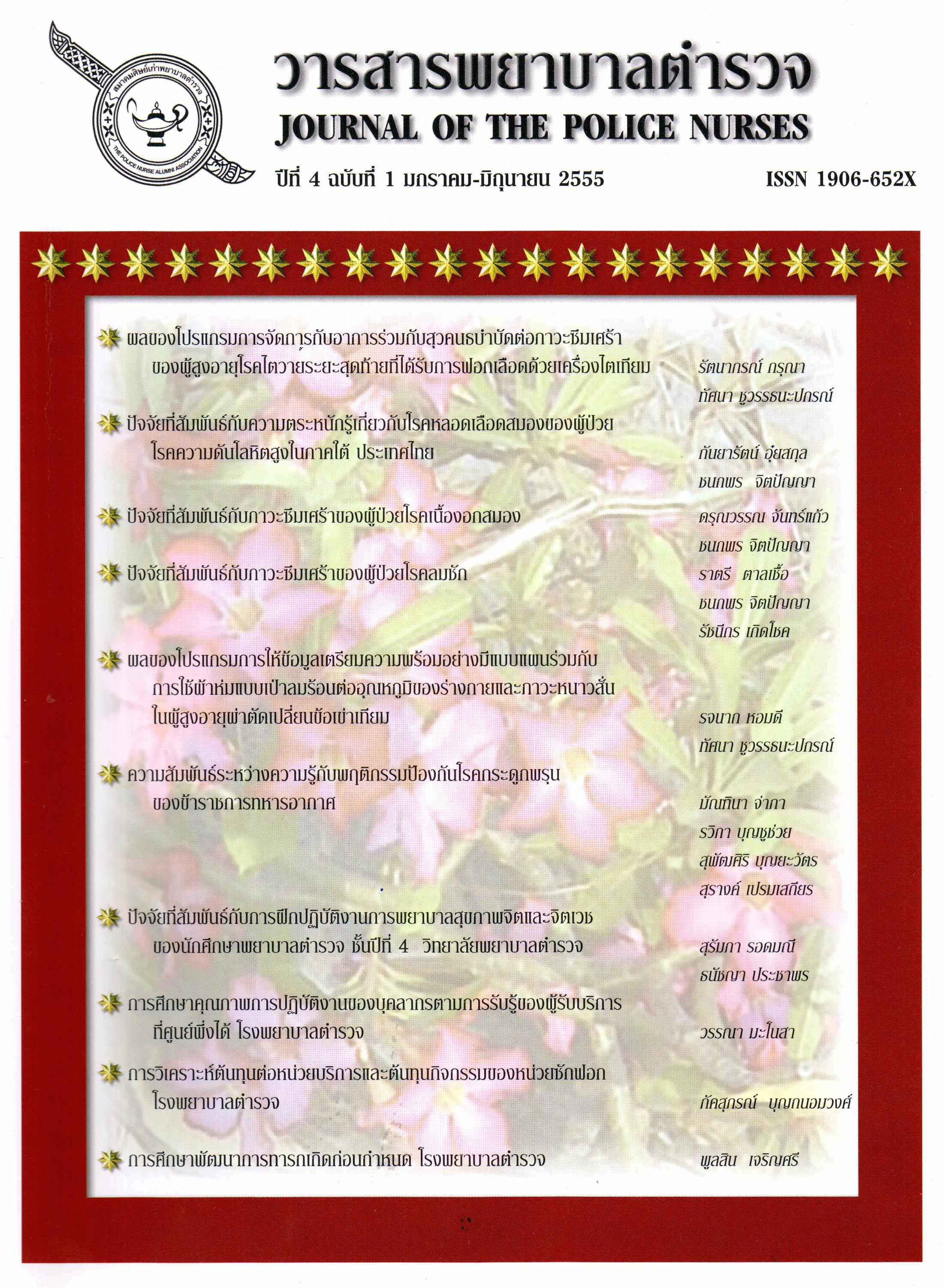ปัจจัยที่สัมพันธ์กับภาวะซึมเศร้าของผู้ป่วยโรคเนื้องอกสมอง
Keywords:
ภาวะซึมเศร้า, เนื้องอกสมอง, depression, brain tumorAbstract
บทคัดย่อ
การวิจัยครั้งนี้เป็นการวิจัยเชิงบรรยายโดยมีวัตถุประสงค์ เพื่อศึกษาความสัมพันธ์ระหว่างปัจจัยคัดสรร ได้แก่ เพศ อายุ รายได้ ระยะเวลาการเจ็บป่วย การทำหน้าที่ด้านร่างกาย การทำหน้าที่ด้านการรู้คิด และการสนับสนุนทางสังคม กับภาวะซึมเศร้าของผู้ป่วยโรคเนื้องอกสมอง ตัวอย่าง คือ ผู้ป่วยโรค เนื้องอกสมองจำนวน 105 คน ที่ได้มาจากการเลือกแบบเฉพาะเจาะจงที่มารับการรักษาที่แผนกผู้ป่วยนอกศัลยกรรมประสาทของโรงพยาบาลจุฬาลงกรณ์สภากาชาดไทย และโรงพยาบาลตำรวจ เครื่องมือที่ใช้ในการวิจัย คือ แบบบันทึกข้อมูลส่วนบุคคลและข้อมูลการเจ็บป่วย แบบประเมินการทำหน้าที่ด้านร่างกาย แบบประเมินการทำหน้าที่ด้านการรู้คิด แบบประเมินการสนับสนุนทางสังคมแบบประเมินภาวะซึมเศร้าซึ่งได้ผ่านการตรวจสอบความตรงตามเนื้อหาโดยผู้ทรงคุณวุฒิ และมีค่าความเที่ยงจากการคำนวณค่าสัมประสิทธิ์แอลฟาของครอนบาค เท่ากับ .72, .90, และ .84 ตามลำดับ วิเคราะห์ข้อมูลโดยใช้ค่าสหสัมพันธ์แบบพอยท์-ไบซีเรียลและไคสแควร์
ผลการวิจัยสรุปได้ดังนี้
1. ภาวะซึมเศร้าเฉลี่ยโดยรวมของกลุ่มตัวอย่างผู้ป่วยโรคเนื้องอกสมอง มีคะแนนเฉลี่ยเท่ากับ 16.10 คะแนน (ส่วนเบี่ยงเบนมาตรฐานเท่ากับ 8.91)
2. รายได้ และการสนับสนุนทางสังคมมีความสัมพันธ์ทางลบกับภาวะซึมเศร้าของผู้ป่วยโรค เนื้องอกสมองอย่างมีนัยสำคัญทางสถิติที่ระดับ .05 และ .01 ตามลำดับ โดยมีค่าสหสัมพันธ์แบบพอยท์- ไบซีเรียล (rpb) เท่ากับ -.27 และ –.38 ตามลำดับ
3. เพศ อายุ ระยะเวลาการเจ็บป่วย การทำหน้าที่ด้านร่างกาย การทำหน้าที่ด้านการรู้คิด ไม่มีความสัมพันธ์กับภาวะซึมเศร้าในผู้ป่วยโรคเนื้องอกสมองอย่างมีนัยสำคัญทางสถิติ
Factors Related to Depression in Patients with Brain Tumor
Abstract
The purpose of this study was to examine the relationships between sex, age, income, length of illness, functional status, cognitive function, social support, and depression in patients with brain tumor. The subjects were 105 out-patients with brain tumor attended at neurosurgery clinics of King Chulalongkorn Memorial Hospital, and Police General Hospital. Samples were selected by a purposive sampling. Instruments used were the demographic data and illness data form, the Karnofsky Performance Status Scale, the MMSE-Thai (2002), the social support questionnaire, and the Center for Epidemiologic Studies-Depression Scale questionnaire. The instruments were reviewed by a panel of experts for their content validity. Internal consistency reliability determined by Cronbach’s alpha were .72, .90, and .84, respectively. Data were analyzed by using Point Biserial Correlation, and Chi-Square test at significant level of .05. Major findings were as follows:
- Mean of depression scores in patients with brain tumor indicated depression with mean scores equal to 16.10 (SD = 8.91).
- There were negatively statistical correlation between income, social support and depression in patients with brain tumor at the level of .05 (rpb = -.27 and –.38, respectively).
- There were no statistical correlation between sex, age, length of illness, functional status, cognitive function, and depression in patients with brain tumor.
Downloads
Downloads
How to Cite
Issue
Section
License
ผลงานที่ได้ตีพิมพ์แล้วจะเป็นลิขสิทธิ์ของวารสารพยาบาลตำรวจ



